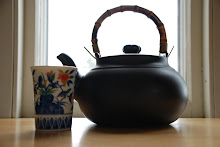
The scents and sounds were familiar. In the kitchen, my mom stood over a stir-fry sizzling on the stovetop, and I breathed in an aromatic swirl of ginger, garlic, and fish sauce. I was back at the home where I grew up, and I fell easily into a rhythm of being I've adopted since returning to visit yearly during the holidays. It was a state of being that was unique. For the time being, I abdicated many adult responsibilities, leaving the workplace behind. Yet, I was not truly on vacation, not in that state of carefree leisure that you would call being on vacation.
I certainly had hours of leisure at hand, unrushed moments to read the book I had brought from home and to catch up with an old friend who still lives in town. And I did readily settle into the well-worn routines that required no effort on my part. It's as if an imprint made by me from a year ago -when I lounged and read on the couch in the family room- were still there, and all I had to do was fall back into this mold, arrange myself neatly with a book, and pick up the thread of my existence from the year past. It seemed a little too easy.
I was surrounded by the past, and I bumped into objects and memories that invited introspection. There was my old Jane Eyre paperback, its binding falling apart, gallantly flanked by two sturdy hardcovers (on WWII tactics that my dad had acquired more recently), collecting dust over the years on the creaky bookshelf in my old bedroom. Jane Eyre was my mom's favorite novel growing up, and when she told me this years ago, my flickering intention to read it grew. I wanted then to peruse the same words that had moved her and share experiences with her across time.
I still have the desire to share experiences with my parents, and so over the holidays, I made matcha for my tea-drinking dad. Each morning, with the chasen (wooden whisk) I had packed from home, I would brew three large bowls of matcha in my parent's kitchen. E and my dad sat at the kitchen table talking while the sun streamed into the large window as I brought out the bowls, their pillars of steam rising. The three of us sipped from our bowls, my dad initially tentative, not knowing what to expect from this dark green liquid in front of him.
It was a fitting convergence: a ritual that E and I shared, transplanted to my old home, transmuted slightly to include my dad. A ritual of preparing and drinking tea that I adopted in adulthood, one that is woven into my current life. Now, in the home where I grew up, my dad drank matcha for the first time, partaking in a ritual that is a part of my life.




















































